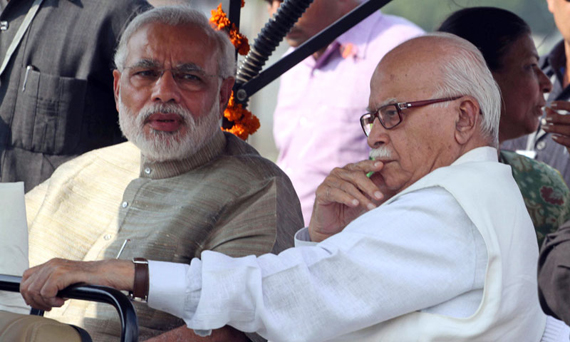 New Delhi, Oct 17: Indian opposition hardliner Narendra Modi has boosted his party's chances of winning looming general elections since being named as its prime ministerial candidate last month, an opinion poll showed on Thursday.
New Delhi, Oct 17: Indian opposition hardliner Narendra Modi has boosted his party's chances of winning looming general elections since being named as its prime ministerial candidate last month, an opinion poll showed on Thursday.
The Hindu nationalist Bharatiya Janata Party (BJP) would win 162 seats in the lower house of parliament if election results reflected the survey, well ahead of the scandal-hit ruling Congress party, forecast to win 102.
But a coalition led by the BJP was expected to win just 186 seats, according to the poll, meaning it would need to win over new allies such as small or regional parties to clinch the 272 seats needed to form a government.
Modi, three times chief minister of thriving Gujarat state, was declared the BJP's candidate in September as the opposition gears up for elections due to be held by May, despite his polarising character.
Many are convinced Modi, 63, can replicate Gujarat's economic success at the national level and revive India's slumping growth, but he remains tainted by deadly religious riots that erupted in his home state.
The survey, conducted by pollsters Team Cvoter for two television channels, suggests Congress, hit by corruption scandals and claims of policy paralysis, would struggle to win a third term in office, sinking to 102 seats at elections from the 206 it holds now.
The BJP has increased its popularity since Modi was named, with a survey by the same pollsters conducted in August predicting the party would win 130 seats, compared with 162 now, in the 545-seat lower house of parliament.
The survey comes as Modi and Congress leaders Sonia and Rahul Gandhi, 43, hold a series of mass rallies across the country in a battle to win five key state elections later this year.
Those elections are a crucial test of popularity, with both parties hoping to capitalise on any momentum from the results for the general election.
Analysts say Rahul Gandhi, 43, is being groomed to take over from Prime Minister Manmohan Singh should Congress again win nationally.
Modi, son of a tea-stall owner, has sought to paint himself as a pro-business reformist who would revive Asia's third-largest economy, currently growing at its slowest rate in a decade.
Though popular with the corporate world, he remains tainted by riots in Gujarat in 2002 in which about 2,000 people were killed, mainly Muslims, according to rights groups.
Modi, chief minister at the time, has been accused of turning a blind eye to the violence. He has denied any wrongdoing.
The survey was based on a national sample of 24,284 randomly selected voters and conducted between August 16 and October 15, a month before and after Modi was declared the BJP frontrunner.





Comments
Add new comment